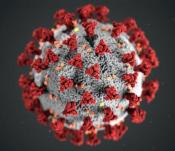Date Posted, by Philip E. Castle, Ph.D., M.P.H.

DCP Director Philip E. Castle, Ph.D., M.P.H.
As this unforgettable year of 2020 comes to an end, I am reaching the milestone of my first 6 months as Director of the NCI Division of Cancer Prevention (DCP). It has been a whirlwind of virtual meetings and introductions. I remain humbled and honored by this opportunity to serve and to rejoin DCP with its rich history of leading cancer prevention science in the U.S. and globally.
DCP sponsors and directs groundbreaking, rigorous, collaborative research to revolutionize and accelerate prevention of cancer and its consequences. I am in awe of the breadth and depth of the division's portfolio and excited to move forward our shared agenda in 2021. As cancer prevention researchers, our goal is to keep those who are healthy, healthy. Successful prevention is the absence of a cancer diagnosis, which is hard to see but critical to achieve. The best cancer is the cancer that never happens.
DCP exceeded expectations for this unprecedented year, and kept research momentum intact despite some unique challenges. All DCP supported researchers can be proud of the work they did in 2020 even with so many SARS-CoV-2 hurdles in their way. I especially want to thank the thousands of people who joined and continued participating in clinical trials.
Here are just a few of the achievements from this year:
- The Early Detection Research Network investigators participated in the development and testing of CancerSEEK, a test of eight proteins and gene mutations in circulating DNA in the blood. The test screens for eight common cancer types that account for more than 60 percent of cancer death in the U.S., and five of these cancers have no screening tests at all. The test received Food and Drug Administration Breakthrough Device designation.

The Cancer Prevention Clinical Trials Network (CP-CTNet), under a new cooperative agreement, was fully constituted and began development of several Phase 0-I-II clinical trials evaluating strategies to prevent cancer. The network has five main academic centers with many affiliated organizations. Each center will design and perform studies that bridge the gap between the preclinical agent development process and Phase II definitive cancer prevention clinical trial. The first patients have been successfully enrolled in CP-CTNet trials already.
- The United States-Latin American-Caribbean HIV/HPV-Cancer Prevention Clinical Trials Network (ULACNet) began this year as an international collaborative research network to bring investigators and institutions in the U.S. and counterparts in low- and middle-income Latin American countries to focus on prevention of Human Papillomavirus (HPV)-related cancers in people living with HIV.
- Patient's with the condition known as Barrett's esophagus (BE) are at increased risk of developing esophageal cancer, a highly deadly disease. In response to a Provocative Question funding opportunity, researchers achieved better understanding of the critical genomic mechanisms that lead to progression of BE to esophageal adenocarcinoma (EAC). They found that the protein CDKN2A/p16 IHC was less expressed in those who went on to develop cancer. This supports previous genomic data and suggests that alterations in these proteins may serve as biomarkers of increased risk of esophageal cancer.
- Early Detection Research Network (EDRN) investigators also participated in the development and FDA approval of the Overa™ test for determining ovarian cancer risk. The test is used in patients with pelvic masses, to determine who is at highest risk for developing cancer, and to help make the decision of whether to do invasive pelvic surgery.
- Studies of naproxen, an anti-inflammatory drug sold over-the-counter for pain relief, showed the drug and the pathway by which this works is a promising strategy for prevention modulating immune response. Studies in mice and humans showed the drug induces immune modulation and changes the dynamics of the cells lining the intestine in those with Lynch Syndrome, also known as hereditary non-polyposis colorectal cancer. In one study, people with Lynch syndrome who used naproxen had the same benefits seen when they use aspirin for prevention. Gene-expression profiles induced by naproxen use may be able to be used as biomarkers to predict activity of the agent.

Cancer Moonshot℠ funded research provided further targets for precision cancer prevention via the PreCancer Atlas (PCA), part of the Human Tumor Atlas Network (HTAN). PCA investigators are working to construct dynamic, high-resolution maps that utilize new and existing data sets to comprehensively characterize the three-dimensional (3D) tumor ecosystem of lung, colorectal, breast, pancreas, and skin precancers. Another part of the Cancer Moonshot℠, the immunoprevention component of the Immunotherapy Translational Network (IOTN), has funded several studies to identify immunoprevention targets including a very promising vaccine strategy using in silico algorithms to predict frameshift neoantigens. Creation of a vaccine that will prevent high-risk cancers of multiple organs is the ultimate goal.

Because of DCP's expertise and experience in immunology, inflammatory, and antibody research, the division is supporting six critical projects to characterize the immune responses elicited by SARS-CoV-2 viral infection. When Congress directed NCI "to develop, validate, improve, and implement serological testing and associated technologies," NCI created Serological Sciences Centers of Excellence and Serological Sciences Research Projects as part of a Serological Sciences Network (SeroNet). DCP is supporting two of the awarded Centers of Excellence and four of the Serological Sciences Research Projects, and all the grantees will collaborate on COVID serology-related projects.
I look forward to 2021 for many reasons. We may see the end of the COVID-19 epidemic, now that science has found vaccines to help prevent infection. And soon the outcome of DCP's strategic planning will set forth our vision for prevention, detection, and supportive care research, and further galvanize us as we strive to reach our objective of healthy lives for all people.
Thank you all for your commitment to cancer prevention research.
If you would like to reproduce some or all of this content, see Reuse of NCI Information for guidance about copyright and permissions. Please credit the National Cancer Institute as the source and link directly to the blog post using the original title, for example: "Scientific Achievements During 2020: An Unforgettable Year of Progress in the NCI Division of Cancer Prevention was originally published by the National Cancer Institute." For questions, contact us at CancerPreventionBlog@mail.nih.gov.
